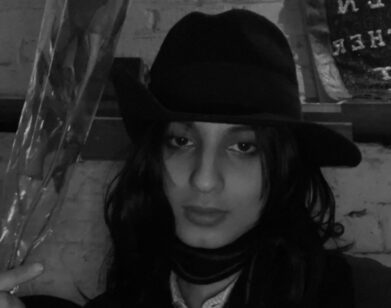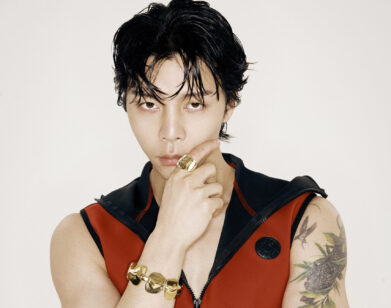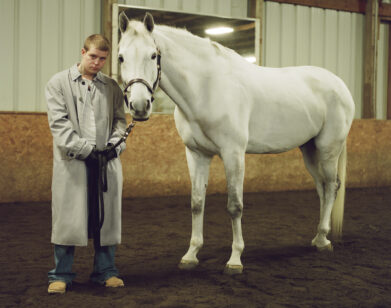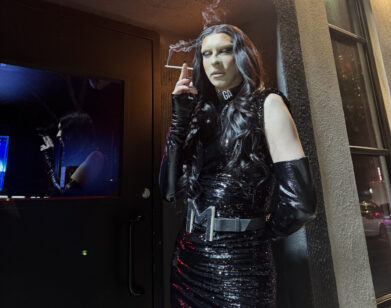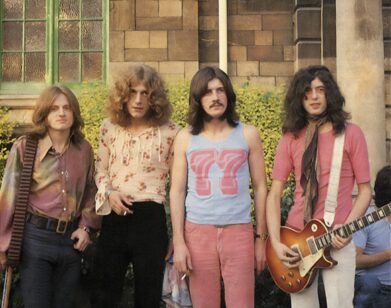The Dark Side of The Soft Moon
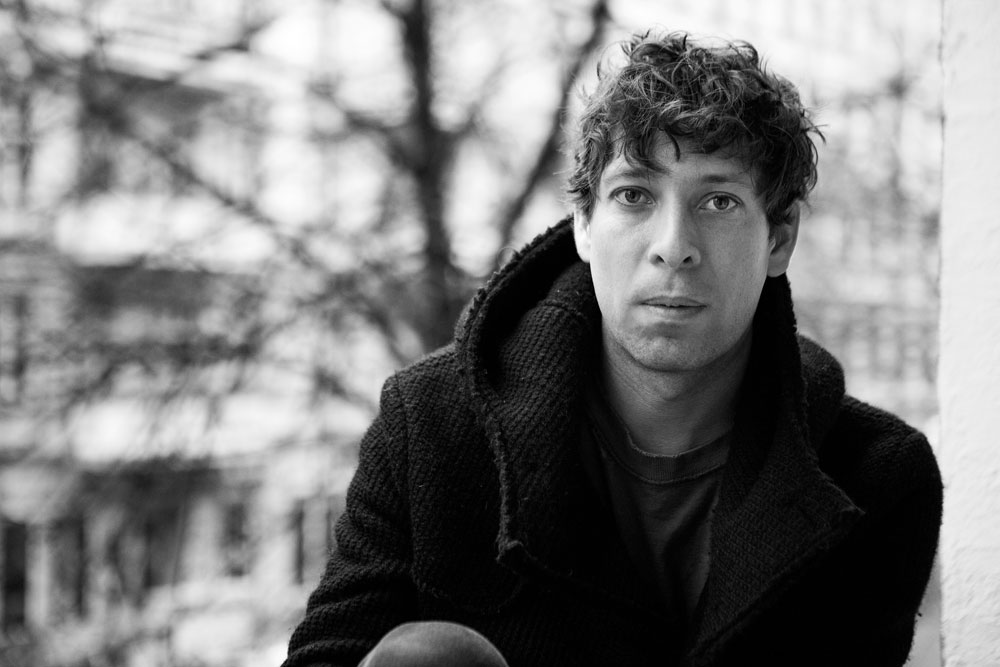
ABOVE: LUIS VASQUEZ (THE SOFT MOON). PHOTO COURTESY OF MARGOT PANDONE.
Listening to The Soft Moon isn’t necessarily easy. With abrasive, industrial synths surrounding Luis Vasquez’s hushed, anguished vocals, the project’s minimalist post-punk production could be straight out of a nightmare. Yet, it’s precisely this gothic hum—filled with bleak sentiments and infectious hooks—that makes us not want to wake.
On the Vasquez’s third full-length, Deeper, which dropped last week via Captured Tracks, the Oakland-born musician creates nihilistic narratives contemplating identity, sanity, and death. Despite being intrinsically melancholic—the “I can’t see my face, I don’t know who I am” refrain on “Being” is particularly haunting—the whole production comes with an air of contentment in the confusion. Vasquez sounds more at peace than in pain, simply playing conduit to the existential dilemmas we all inevitably ponder. And while he’s admittedly matured since 2012’s Zeros, the producer, singer, songwriter, and instrumentalist continues to only evoke questions, providing no answers to these universal quandaries.
Vasquez, whom we spoke with over the phone from his home in Berlin, is still grappling with the significance of Deeper, but that’s fine by him.
BENJAMIN LINDSAY: Are you living in Berlin now?
LUIS VASQUEZ: Yeah, I’ve been here since July of last year.
LINDSAY: For a little while, you were kind of moving back and forth from Berlin to the U.S., right?
VASQUEZ: Yeah, I was coming here [to Berlin] quite often—probably about 10 times a year. I think it was about time to make it my home.
LINDSAY: Why the love affair?
VASQUEZ: I guess business, really—just a lot of touring in Europe, and Berlin is usually where we start our tours. And it’s definitely a nice city for being influenced and creative at all times. I meet musicians every day.
LINDSAY: Do you feel like living in a city lends itself to unpacking some of the themes you’re exploring on Deeper, like anxiety and isolation?
VASQUEZ: Honestly, with Deeper, I wasn’t so much influenced by my surroundings. I focused completely within. I locked myself indoors and all my inspiration came from myself. It’s usually not until later, when I’m looking back, that I start connecting my environments. During my creative process, I’m not even thinking about where I am. I can’t help what my subconscious does.
LINDSAY: Do you feel that Deeper differs in your approach to these themes?
VASQUEZ: With the previous album, I was kind of lost. I was in a weird part of my life and felt very frustrated; I had more anger than I normally do. I feel like I’ve matured. I’ve had a lot of time to think and reflect and maybe understand a little bit more about who I am. So that’s probably the main difference with Deeper in comparison to the previous releases.
LINDSAY: Are there any tracks on the LP that stand especially true?
VASQUEZ: I think it was maybe “Wasting”… Well, pretty much the majority of Deeper. It’s weird—I don’t normally know what I’m doing during the creative process, but I felt like I did. I felt like I had more control. I felt like my skills had gotten a little bit better as a songwriter, which is ironic because I’m pretty concerned with the structure, the themes, and the concepts and how they work; the lyrical content is kind of full of confusion. It’s like I honed my craft in terms of songwriting, but now that I’m singing more and writing more lyrics, it’s almost like I’m starting from the beginning.
LINDSAY: In something like “Feel” you’re asking, “Why are we alive?” And then in “Being” you’re asking, “What is this place?” Through the creation of Deeper, did you find answers to any of these questions, or are they still lingering in the air?
VASQUEZ: They’re still lingering. It’s going to take some time for me to gain any sort of answers from the record. I think what I need to do is the touring part. The live aspect is like the yin-yang of the project. The writing is the inward and asking the questions, and then the live aspect is the release. I think I need both of them to gain any form of knowledge I was looking for.
LINDSAY: Does audience reception play a role in that?
VASQUEZ: Yeah. Because music is a universal language, I think I’m looking for answers not just through the music itself, but maybe the music is a tool to connect with other people, to perhaps gain information and knowledge. It does work, because when I meet people along the road, they come up to me and they tell me they feel the same way and then they tell me their perspective on a certain topic that I sing about or a theme that I sing about. It’s kind all working out in the end.
LINDSAY: One of the first things I noticed about Deeper was that each song has a staccato, single-world title. Was that a calculated move?
VASQUEZ: I didn’t even realize I was giving each track a one-word name. It wasn’t until maybe three or four tracks in that I realized I was doing that. But when I did see that, I thought I should probably continue because it was happening for a reason. I feel like when you give something just one title, it leaves it more open to someone’s imagination or perspective. When you listen to a song called “Deeper,” I might think of the word a different way than the listener does, and the listener can embrace the song with an open mind.
LINDSAY: I was reading an interview you did a couple years ago for Zeros, and you said that Zeros may be the last album you do completely on your own, that you may bring other people into the process. Is that something that you did with Deeper?
VASQUEZ: No, I still wrote everything alone. I am open to collaborating in the future, I just feel like I’m not there yet. I think I need to get to where I feel more comfortable. To be good to other people, you have to be good to yourself. It’s sort of that philosophy. But also, because this album is so personal and I’m trying to learn about who I am, what I am, my existence, and all these things, I feel like for me to create everything with my own hands tells me more about myself. It’s my own body making every noise, every sound. Because of that, it’s more pure in terms of finding that inner peace and discovering who I am.
LINDSAY: I can’t help but feel your work would make for a great soundtrack. There’s something very cinematic, even in the video for “Far.” If you could work with a filmmaker, who do you feel would fit your sonic aesthetic?
VASQUEZ: I’ve thought about this quite often, actually. I’d like to work with Alejandro Jodorowsky. I don’t know if you saw that documentary, Jodorowsky’s Dune, but something like that would’ve been amazing. Something extremely epic and sci-fi.
LINDSAY: Prior to making music professionally, you were a graphic designer. Do you play a hand in the design of your album art?
VASQUEZ: Yeah, I do all the artwork.
LINDSAY: What are we looking at, exactly, on the jacket for Deeper?
VASQUEZ: It ties in with the title of the album. I guess what I’m trying to say is I’m tearing layers in order to go deeper, but there’s still pieces of the past. The paper that’s still there is representative of things that I still hadn’t overcome yet.
LINDSAY: You have that splash of read in the corner, too.
VASQUEZ: The red, for me, is like the passion I have.
LINDSAY: With listeners who are family and loved ones, what is their reaction to some of your more depressing sentiments?
VASQUEZ: I went to visit my mom over Christmas, and she mentioned something along the lines of, like, “The world that you’re creating—you’re going to attract negative things in your life.” For the longest time, I was hiding my music from her because in the beginning, it was about my childhood. My childhood wasn’t the best. I don’t think a lot of us had the perfect childhood, but mine was pretty traumatic at times, and my relationship with my mom was pretty bad. There are a lot of undertones in the music that I know she’d connect to, so for the longest time, I didn’t show her anything. It wasn’t until I was creating Deeper that I started showing her tracks here and there. I was scared. We have this relationship where she always apologizes for not being a good mother and things like that, and when she hears my music, she can totally hear how it’s affected me. But I feel like there’s a closure now, and that’s why with this record I felt more comfortable showing her what I was doing. I’ve had some closure with myself and she’s had some closure with herself. I think that’s what Deeper entails, as well. When I started showing her my music, things opened up and the relationship got better. It’s amazing.
DEEPER IS AVAILABLE NOW. THE SOFT MOON PLAYS AT THE MUSIC HALL OF WILLIAMSBURG TOMORROW, SATURDAY, APRIL 11.

